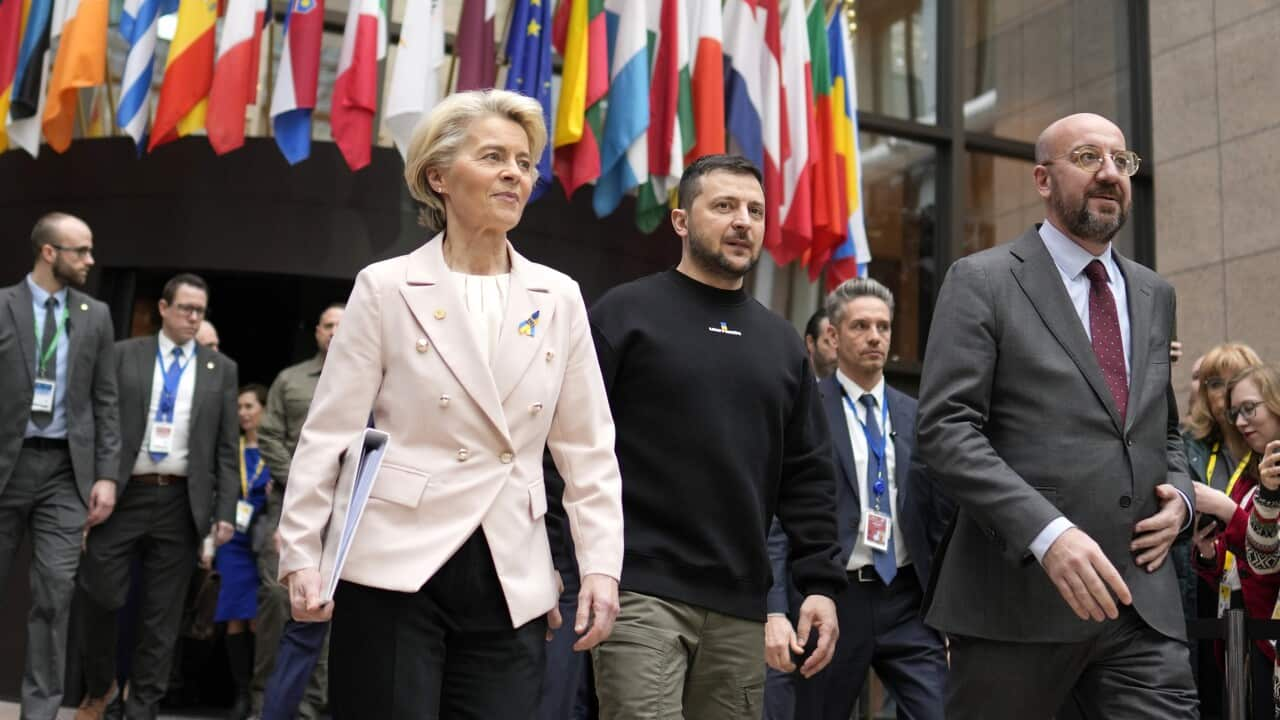KEY POINTS
- The EU has opened membership talks with Ukraine.
- It's a historic decision, but membership is likely to be years away.
- Hungary objects to membership talks.
European Union leaders have made a historic decision to open membership talks with Ukraine, bypassing objections from Hungary to give Kyiv a major political boost as its war against Russia's invasion grinds on.
Although membership would likely be many years away, the decision at a summit in Brussels takes Ukraine a step closer to its long-term strategic goal of anchoring itself in the West and liberating itself from Moscow's orbit.
The move came at a critical time for Ukraine, after its failed to make major gains and with United States President Joe Biden unable to get a $US60 billion ($89 billion) aid package for Kyiv through the United States Congress.
The EU decided in a highly unorthodox fashion: Hungarian Prime Minister Viktor Orban, who cultivates close ties with Moscow, agreed to leave the room while his peers from the EU's 26 other members agreed on the move.
"This is a victory for Ukraine. A victory for all of Europe. A victory that motivates, inspires, and strengthens," Ukrainian President Volodymyr Zelenskyy declared on Thursday.
"I congratulate every Ukrainian on this day ... History is made by those who don't get tired of fighting for freedom."

Hungarian Prime Minister Viktor Orban called the decision to start talks "irrational" and "inappropriate". Source: AAP, EPA / Olivier Matthys
The leaders also agreed to accession talks with another former Soviet republic, Moldova, and to grant another, Georgia, the status of membership candidate.
"It is clear that these countries belong to the European family," Scholz said on social media platform X, formerly known as Twitter.
The leaders said they would also start membership talks with Bosnia once it had undertaken certain political reforms.
On Thursday evening, the EU leaders were still to decide on a proposal to grant Ukraine 50 billion euros ($82 billion) in vital financial aid as part of a broader top-up of the bloc's long-term budget.
Orban had previously objected to that plan too.
He had cited corruption and other issues in arguing Ukraine was not ready for EU talks but EU diplomats suspected he was using the issue as a bargaining chip to try to unlock EU funds frozen over concerns about the rule of law in Hungary.

German Chancellor Olaf Scholz played a key role in getting Hungarian Prime Minister Viktor Orban to leave the room to clear the way for a decision, diplomats and officials said Source: Getty / Getty Images Europe
Orban stood by his objections to membership talks for Ukraine even after the decision was taken.
"Hungary's stance is clear, Ukraine is not prepared for us to start talks on EU membership," he said, calling the decision to start talks "irrational" and "inappropriate".
In the midst of war, geographically bigger than any EU member and with a population of 44 million, Ukraine presents some challenges for admission to the 27-member bloc.
But membership talks will likely take years and will not start immediately.
First, the EU will have to agree to a negotiating framework for the talks, which will require another unanimous decision.
The leaders said they would take this step once Ukraine met outstanding requirements on democracy and the rule of law.
Many EU leaders had warned that not agreeing to start negotiations would have been seen as a victory for Russian President Vladimir Putin.









